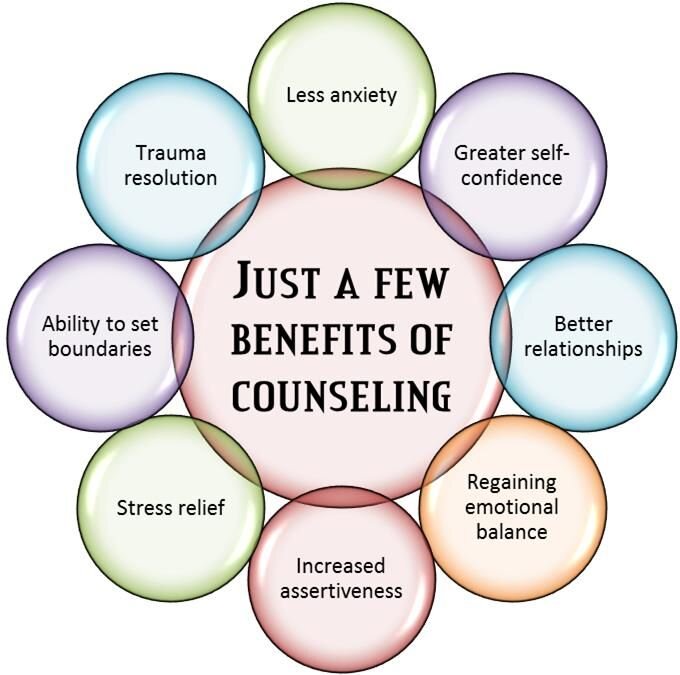Cognitive Behavioural Therapy: How It Transforms Thought Patterns
Wiki Article
Unlocking the Tricks of Mental Wellness: An Introduction of Therapy and Therapy Alternatives
Psychological health and wellness is a facility and critical aspect of overall health. Many therapy and therapy alternatives exist to deal with various psychological difficulties. Each technique offers unique advantages and approaches tailored to private needs. Comprehending these alternatives is necessary for anyone looking for to improve their mental wellness. Cognitive Behavioural Therapy. What factors should one think about when discovering these methods? The response may disclose a course to a healthier emotionRecognizing Mental Wellness and Its Relevance
Psychological health and wellness encompasses the emotional, emotional, and social wellness of people, significantly influencing just how they assume, feel, and act. Its value can not be overstated, as it affects every element of life, including relationships, work performance, and general quality of life. Individuals with good mental wellness often tend to deal with stress better, preserve healthier partnerships, and make educated choices. On the other hand, inadequate psychological wellness can result in emotional distress, damaged performance, and various mental conditions, which might need professional treatment. Comprehending psychological wellness is necessary for recognizing the indications of distress and the requirement for support. Understanding also advertises compassion and minimizes preconception, encouraging individuals to look for assistance when required. By prioritizing mental wellness, areas can promote settings that support emotional health, eventually bring about much healthier, a lot more durable individuals. This foundation acts as a vital action towards efficient mental health counseling and therapy options.
Kinds Of Counseling Strategies
Therapy strategies vary commonly, each customized to meet the distinct needs of people looking for support. Among one of the most typical kinds are cognitive-behavioral therapy (CBT), which concentrates on recognizing and transforming adverse thought patterns, and person-centered therapy, which emphasizes compassion and approval. Psychodynamic treatment checks out unconscious processes and past experiences to recognize existing behavior, while solution-focused short treatment aims to recognize remedies instead of examine problems.Additionally, family therapy addresses relational dynamics and communication within family members, fostering healthier interactions. Team counseling offers a communal area for participants to share experiences and support one an additional. Various other approaches consist of existential treatment, which motivates individuals to locate significance and function, and art or songs therapy, which uses innovative expression as a restorative tool. Each technique provides unique methods and approaches, enabling clients to discover one of the most ideal method for their personal development and recovery trips.Exploring Different Therapy Methods
In the domain of mental health counseling, numerous therapy techniques offer distinct approaches to treatment. Cognitive Behavior Treatment emphasizes the link between habits and ideas, while Psychodynamic Treatment discovers subconscious influences on psychological health. In Addition, Mindfulness-Based Methods advertise present-moment recognition as a way to boost emotional policy and general mental wellness.Cognitive Behavior Therapy
Cognitive Behavior Modification (CBT) stands out as one of one of the most widely exercised and looked into modalities in mental wellness treatment. This strategy concentrates on the interconnection between thoughts, feelings, and behaviors, emphasizing that changing unfavorable thought patterns can bring about improved psychological wellness and behavioral changes. CBT is structured, usually involving a limited number of sessions, and aims to gear up people with practical abilities to manage their signs. It works for a range of conditions, consisting of stress and anxiety disorders, anxiety, and post-traumatic stress and anxiety condition. By utilizing strategies such as cognitive restructuring and direct exposure treatment, CBT cultivates durability and encourages customers to face obstacles head-on, making it a valuable alternative in the landscape of mental wellness therapies.Psychodynamic Therapy Approaches
Psychodynamic treatment approaches offer a deep exploration of the unconscious mind and its impact on habits and psychological well-being. Rooted in Freudian concept, these techniques highlight the significance of very early youth experiences and subconscious disputes. Through strategies such as free organization, desire analysis, and transference, people acquire insight right into their feelings and ideas, cultivating self-awareness and understanding. This therapeutic method encourages customers to reveal repressed emotions and unresolved concerns, which can be essential in addressing present emotional obstacles. By examining the interplay between previous experiences and existing actions, psychodynamic therapy aims to advertise emotional recovery and individual development. Eventually, it supplies a framework for people to explore complicated inner characteristics that affect their psychological wellness.
Mindfulness-Based Strategies
While traditional therapies frequently concentrate on past experiences, mindfulness-based strategies prioritize present-moment understanding as a pathway to psychological well-being. These techniques, consisting of mindfulness-based cognitive treatment (MBCT) and mindfulness-based tension decrease (MBSR), urge people to involve completely with their thoughts and sensations without judgment. Experts find out to observe their psychological states, cultivating a better understanding of emotional triggers and feedbacks. This practice not only relieves signs of stress and anxiety and clinical depression but likewise enhances total mental resilience. By incorporating mindfulness workouts, such as reflection and deep breathing, clients cultivate a sense of peace and clearness. Ultimately, mindfulness-based techniques equip individuals to browse life's difficulties with increased recognition and approval, promoting a much healthier relationship with their thoughts and feelings.The Role of a Specialist or Counselor
A skilled therapist or counselor plays an important duty in supporting people through their mental health and wellness journeys. They offer a safe, non-judgmental area where clients can express their thoughts and feelings freely. Mental Health Resources. By utilizing various healing methods tailored to every person's requirements, therapists aid clients explore underlying problems that may add to their psychological wellness challenges.Therapists supply support and tools to deal with tension, anxiousness, clinical depression, and other psychological difficulties. Their training furnishes them to identify patterns in actions and thought processes, helping with understandings that lead to personal development. They likewise foster a solid healing partnership, which is vital for successful outcomes.Moreover, therapists stay committed to discretion and moral requirements, guaranteeing a relying on environment. Inevitably, the duty of a therapist or counselor is to encourage individuals, motivating them to develop durability and healthier coping strategies while steering with life's complexitiesHow to Select the Right Counseling or Therapy Choice
Choosing the appropriate counseling or therapy alternative starts with evaluating specific requirements. It is necessary to understand personal difficulties and objectives before discovering numerous therapy designs. This foundational action can substantially influence the performance of the chosen method.Assess Your Requirements

Just how can individuals successfully examine their mental health and wellness requires when assessing therapy or treatment choices? They should show on their emotional state and identify certain problems, such as anxiety, relationship, or anxiety challenges. Journaling can be a useful device for tracking thoughts and feelings with time. In addition, people may take advantage of looking for feedback from relied on pals or relative relating to perceived modifications in behavior or state of mind. It is likewise valuable to review individual goals for therapy, such as improving coping skills or gaining insight right into personal patterns. Ultimately, researching numerous counseling modalities and their suitability for details demands can assist in making an enlightened option. Inevitably, self-awareness plays a crucial function in choosing the ideal path for mental health support.
Discover Therapy Designs
While passing through the diverse landscape of treatment alternatives, people need to take into consideration various styles of counseling to find the very best suitable for their distinct requirements. Cognitive Behavioral Treatment (CBT) concentrates on altering negative thought patterns, while Psychodynamic Treatment explores unconscious procedures and previous experiences. Humanistic techniques emphasize individual growth and self-actualization, fostering a supportive atmosphere. Additionally, mindfulness-based therapies grow present-moment recognition, aiding psychological regulation. For those looking for structure, Solution-Focused Brief Therapy targets click here for info details goals and solutions. Team treatment provides a common setup for shared experiences and support. Eventually, people should review their choices, comfort degrees, and particular challenges, guaranteeing they pick a restorative style that resonates with their personal journey towards psychological well-being.Conquering Obstacles to Seeking Help

The Benefits of Counseling and Therapy for Mental Health
Seeking aid for psychological wellness difficulties can bring about considerable enhancements in overall well-being. Counseling and therapy offer individuals with a secure area to discover their thoughts and feelings, promoting self-awareness and personal growth. These expert services equip customers with coping approaches and analytic abilities tailored to their distinct situations.Moreover, treatment can lower signs of anxiety, depression, and other mental health and wellness disorders, enhancing emotional strength. Normal sessions advertise accountability and encourage people to establish and attain individual goals. With different therapeutic modalities, such as cognitive-behavioral treatment or mindfulness practices, customers find out to reframe unfavorable thoughts and develop healthier behaviors.Additionally, the restorative connection itself can be a resource of assistance, assisting to battle seclusion and loneliness. Generally, participating in counseling and treatment is a proactive action toward achieving mental health, making it possible for people to lead more fulfilling lives.Frequently Asked Questions
How Much Time Does Counseling or Treatment Commonly Last?
The period of counseling or treatment varies substantially, commonly lasting from a couple of sessions to a number of months or years. Variables influencing this include the individual's certain demands, the sort of therapy, and healing objectives.What Should I Expect Throughout My Very First Session?
Throughout the first session, people can anticipate an intro, discussion of problems, and the therapist's approach. They might complete evaluations and develop goals, fostering a risk-free setting for open communication and building rapport.:max_bytes(150000):strip_icc()/depressed-man-lying-on-couch-talking-to-therapist-748319455-5a612746eb4d520037d78ca6.jpg)
Are There Any Type Of Threats Connected With Therapy?
Therapy can entail threats, such as psychological pain, vulnerability, or challenging agonizing memories. While these challenges may arise, they can likewise cause personal growth and healing, making the therapeutic process facility yet possibly rewarding.How Can I Tell if My Therapist Is a Great Fit?
Identifying if a specialist is a good fit entails reviewing convenience, communication style, and healing method. Favorable relationship and progression in the direction of goals Get More Information are indications of an appropriate match, necessary for efficient mental health and wellness assistance.Will My Insurance Coverage Cover Counseling or Treatment Procedure?
Identifying insurance policy protection for therapy or treatment sessions often calls for calling the insurance copyright straight. Policies vary substantially, so individuals ought to verify advantages, co-pays, and any kind of needed pre-approvals before seeking treatment services. Amongst the most typical types are cognitive-behavioral therapy (CBT), which concentrates on determining and changing unfavorable idea patterns, and person-centered treatment, which emphasizes empathy and approval. Psychodynamic treatment checks out subconscious processes and previous experiences to understand existing habits, while solution-focused brief treatment aims to identify solutions rather than explore problems.Additionally, family treatment addresses relational characteristics and interaction within family members, fostering much healthier interactions. Other strategies include existential therapy, which urges people to find meaning and function, and art or music treatment, which uses creative expression as a healing device. Cognitive Behavior Treatment highlights the link in between actions and thoughts, while Psychodynamic Therapy explores unconscious influences on psychological well-being. Cognitive Behavioral Treatment (CBT) focuses on transforming negative thought patterns, while Psychodynamic Treatment explores previous experiences and Get More Info subconscious processes.Report this wiki page